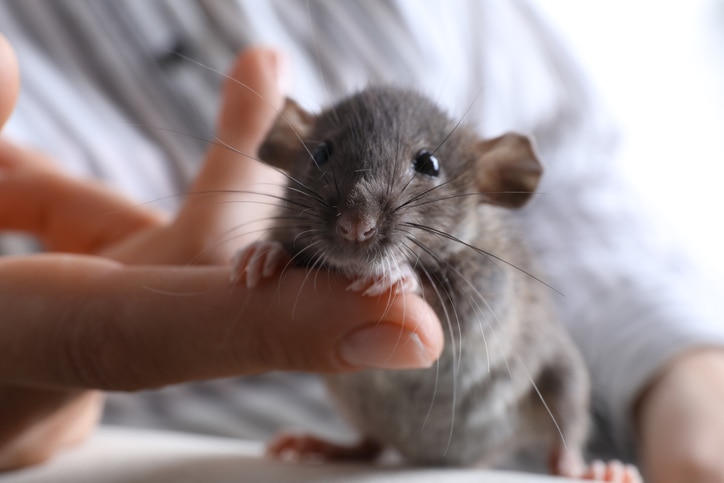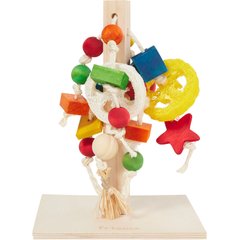How to Decode Your Rat’s Sounds to Understand Them Better

Photo by Liudmila Chernetska/iStock/Getty Images Plus
Rats are chatty creatures who make various noises, from bruxing and squeaking to hissing and screaming. These different rat sounds clue you in on how your little friend is feeling and whether they’re happy, bored, uncomfortable, or maybe even sick.
Like other small prey animals, rats tend to hide symptoms of illness until it’s too late, so being able to decode your pet rat’s vocalizations can help you know when it’s time to head to the vet.
We talked to experts to learn more about rats and the sounds they make.
Key Takeaways
- Rats are chatty creatures who begin to vocalize with their mom as soon as they’re born.
- You can use your rat’s sounds to determine whether they’re happy or not feeling so great.
- Humans can’t hear all rat sounds: Some are in ultrasonic ranges undetectable to us.
Do Rats Use Sound To Communicate?
The short answer is yes—rats do use sound to communicate! While the human ear is incapable of hearing some rat sounds due to their ultrasonic frequency, our talkative rats do use certain noises to express themselves.
In fact, as soon as they’re born, rats begin vocalizing to communicate with their mom.
Rats also use sound to communicate a positive or negative emotion, such as:
- Expressing innate needs
- Calling other rats during social interactions or play
- Defense upon detecting predators, unfamiliar humans, or sudden noises
When communicating with humans, rats use noises for specific situations, whether it’s to let you know they’re delighted to be pet or annoyed about being picked up.
By listening to the sounds we can hear, we can gather a better understanding of what our clever and cuddly companions are trying to tell us.
How To Decode Your Rat’s Sounds
Here are a few rat noises and their meanings to find out what your rodent BFF is telling you.
Bruxing
Bruxing is a rhythmic grinding or chattering of teeth, says Sabrina Kong, DVM, at We Love Doodles in San Mateo, California. Teeth chattering is often paired with a rat’s eyes rapidly bulging, also known as “boggling.” Not only is this downright adorable—and maybe concerning to witness at first—but it’s also one of many common rat behaviors that usually means they’re happy and relaxed.
Bruxing is also good for rats to help wear down their continuously growing front incisors, says Christine Malazarte, president and founder of South Bay Rodent Rescue in Lawndale, California.
Wooden rat toys can help wear down incisors too.
Recommended Products
However, there are some instances where a rat bruxing isn’t always positive.
“While gentle bruxing signals contentment, like a cat’s purr, intense bruxing can indicate pain, stress, or illness,” Dr. Kong says.
Take note of physical cues too: If you notice your rat showing their teeth while chattering, they may be agitated. If bruxing accompanies lethargy or labored breathing, a vet visit is in order.
Squeaking
Squeaking is a short, high-pitched sound, and the pitch of the squeak and the context in which it happens determines how your rat is feeling, Malazarte says.
For example, a sudden, high-pitched squeak could indicate pain or surprise, while a soft, low-pitched squeak could mean they’re content socializing with their rat buddies.
Some rats are naturally more vocal than others and can be sensitive to their environment, even giving a light “eep” when being gently poked by another rat, Malazarte says. It’s also normal for these cute critters to squeak when they’re playing with each other.
If you notice any unusual symptoms, such as your rat sneezing a lot and squeaking, it’s best to consult your vet right away.
Screaming
If you hear a rat screaming, their loud, shrill shriek will resemble a bird’s cry, Dr. Kong says. “This is a distress call signaling terror, severe pain, or aggression during fights,” she explains. “Immediate veterinary attention is crucial to address the cause.”
Chirping
Rats do chirp. Researchers tickled rats—yes, really—to learn more about their brain activity during playtime and found that they make chirping vocalizations like a child’s laughter.
Unfortunately, this happy kind of chirping is not audible to the human ear. Thankfully, though, we can hear the chirps they make when they need help.
If you do hear your rat making chirping noises, consult your vet to rule out the possibility of a respiratory infection since they’re common in rats.
Hissing
Hissing in a rat sounds like a sharp and forceful exhale, like a tiny snake. Rats hiss when frightened, defensive, or establishing dominance, Dr. Kong says. This sound is a warning for others to stay away, which can be common during introductions to new friends.
Watch for persistent hissing with nasal discharge in rats, as this may indicate a respiratory infection, Dr. Kong notes.
Huffing
Huffing in rats is a deep exhale, the same way that humans huff. This typically means a rat is feeling grumpy or annoyed and may be accompanied by them pawing at something and/or puffing themselves up, Malazarte says.
Sniffling
It’s normal for rats to sniff, or inhale air with their nose in a voluntary, subtle way. Sniffling, however, is involuntary and louder, and it can be a telltale sign of a respiratory infection.
Grunting
Grunting is a short, low vocalization rats can make. Sometimes, rats grunt out of happiness or excitement, such as when they’re interacting with their human, getting pet, or playing with their rat friends, Malazarte says. A happy or excited grunt is quick and happens occasionally.
Other times, grunting can be a sign of a health issue. If it’s prolonged and happens consistently with no context at all, reach out to an exotic vet.
Clicking
Clicking sounds like crackling when a rat breathes. This, along with congestion, are signs of a respiratory illness. If a respiratory issue in rats is severe, the clicking will sound like Rice Krispies Treats and should be considered an emergency, Malazarte says.
One way she checks for any sounds coming out of the lungs is by gently holding a rat’s rib cage to her ear on both sides and listening for anything out of the ordinary.
Wheezing
Wheezing is a whistling sound that can occur when rats breathe, similar to how humans wheeze. This is usually accompanied by other physical signs and can also indicate a respiratory infection, Malazarte says.
Can Your Rat’s Sounds Tell You If They’re Sick?
Yes, if your rat is chirping, hissing, or sniffling, they might be sick. According to Merck Veterinary Manual, other signs of a respiratory infection or disease in rats to watch for include:
- Nasal discharge
- Rapid, shallow breathing
- Weight loss
- Sneezing
- Inactivity
- Hunched posture
- Ruffled coat
- Head tilt
- Reddish-brown staining around the nose and eyes
“Always observe body language alongside sounds,” Dr. Kong says. “A puffed coat, pinned ears, or hunched posture paired with vocalizations often signals distress.”
Remember that rats tend to hide illness until the last minute, so it’s important to know the signs of what’s usual for your pet and what’s not.
If you have any hesitations, play it safe and see your vet.
FAQs
Can we hear all rat sounds?
No, we can’t hear all rat sounds, as they frequently communicate in ultrasonic ranges undetectable to humans without specialized equipment.
“Pups use these high-pitched sounds to signal distress or cold, while adults emit ‘happy’ ultrasonics during play, mating, or positive social interactions, like being petted,” Dr. Kong says. “These hidden vocalizations reveal a rich emotional landscape we often miss.”
Do rats squeak like guinea pigs?
Yes, rats squeak like guinea pigs. However, rat squeaks serve different purposes, Dr. Kong says. Guinea pigs “wheek” when they’re excited—usually for food—while rats use short, high-pitched squeaks typically during mild protest or surprise.







